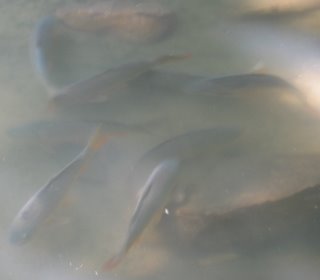
When we left off from the story, I was just realizing that my mind had escaped me and I caught up with it to find it wallowing in the creek bed indulging in fantasies about communing with the trapped fish I had set free the day before. This is the fourth and last in my 4-part fish story. In case you haven’t been following, the preceding parts are here (first) here (second), and here (third).
[I'm sorry that my links don't work. I will fix them later; meanwhile you can scroll down and find the previous episodes that appeared in the last few days.]
As Nancy and I proceeded along the creek we kept seeing more of these fish, who would just hang out as we waded past them, continuing to linger undisturbed just under the surface, seemingly unalarmed by our lumbering presence. All of these fish were an average of ten or twelve inches long, well past the size you’d have to throw back if you caught one while fishing. Later on when I wondered aloud why hordes of fishermen weren’t stampeding the banks, I was told they were carp and therefore not good for eating.
I’ve always heard that about carp, except when I spent that year in Czechoslovakia where carp is cultivated as the Christmas turkey. In the days before Christmas each family kept their newly-purchased carp swimming around in their bathtub and displayed it proudly to any guest that might drop by. Much to my surprise, it was incredibly delicious. But don’t tell anyone, or these innocent fish who have learned to coexist peacefully among the legs of waders will have to learn to fear us.
But being as yet still undiscovered in America, they clearly did not fear Nancy and me, but accepted us as if they recognized our extremities as extensions of what were once fins and assumed we were distant relatives. Only when Nancy would unsuccessfully try to catch one by darting her hands into the water at the attempted speed of a crane’s beak did they reveal any inclination to flee.
This gave me an idea, and the next time we saw one near our legs I became very still. I lowered myself slowly into a crouching position, and began talking softly to the fish. “Hi little fishie,” I said, along with other assorted utterances I thought a fish might find comforting, all of them much too fatuous to admit publicly. Slowly I cupped my hands under the fish, scooping up a little mud so it would not be startled by the contact with a strange skin, and lifted it just a bit higher in the water and then lowered it back down.
Meanwhile I became aware that the cloth concealing my derriere from the prying world at large was wicking up water. In my intense concentration on the fish I had inadvertently dipped myself into the creek instead of hovering just above the waterline as planned. I did not allow this realization to distract me, however, as by now I had gained the total trust of the fish. I raised it up again, this time all the way out of the water. The fish continued to remain relaxed while I played with it in this way, murmuring to it affectionately while raising it up and then submerging it again like one might do with a small child in a swimming pool.
I tried this with a couple of other fish and met with similar cooperation. Lest you have any question about the health of these fish, I hasten to assure you that my fish credentials are as long as your arm. Discerning illness in a fish is one of my more finely honed skills, thanks to a childhood-long dedication and loyalty to goldfish.
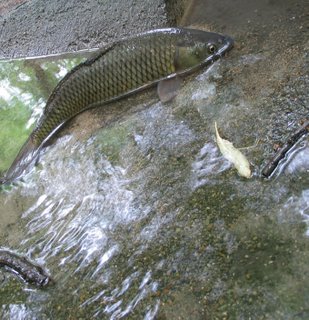
The last fish I played with on that auspicious day was resting on its belly in the mud in the shallowest of water. Its gills could not have been fully submerged, yet it seemed perfectly content. I spent a few minutes pouring fresh cool water over it from my cupped hands, which it seemed to appreciate. After carefully ruling out the possibility that it was laying eggs, I offered to scoot it into deeper water, but it turned me down with a couple of leave-me-alone flips and repositioned itself.
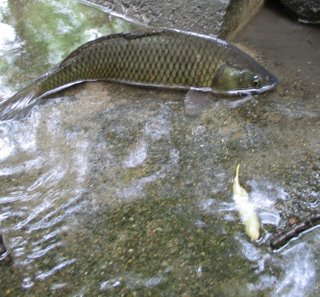
None of the fish I mingled with that day were the same one I had rescued previously – I checked, of course. That leaves us with three plausible explanations as to the docile behavior of these fish.
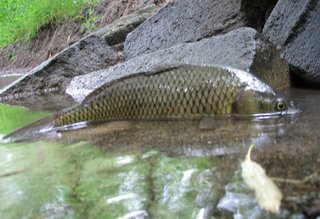
One: the fish intuited my inner resumé of devoted attention to their carp cousins, the goldfish, and thereby knew I wouldn’t harm them.
Two: the fish I rescued told all the other fish about the experience, assuring them that “If some chick comes along who's got this particular smell, she’s cool.”
Three: these fish are so completely unthreatened by human predators that they’ve become ridiculously tame and will behave that way with any human being who approaches them in a slow and gentle manner.
I hope number three is not the answer, because then I don’t get to feel very special, do I?
No doubt you’ll be noticing that none of the photos actually show my divine act of handling the live fish. In fact, I transferred my camera to Nancy, instructing her to snap close-up photos of my hands cradling the fish, but none of them came out. She might have neglected to push down the button far enough, being unfamiliar with my newfangled digital camera. Or, it could be like when you take a picture of a ghost and it doesn’t come out because a ghost doesn’t leave an image, and then nobody believes you. (Don’t you hate that?) I’m glad I had a human witness. Nancy saw it all, and can back up every inch of my story.
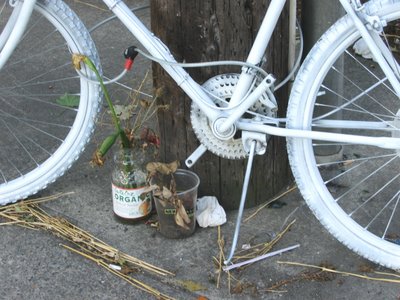
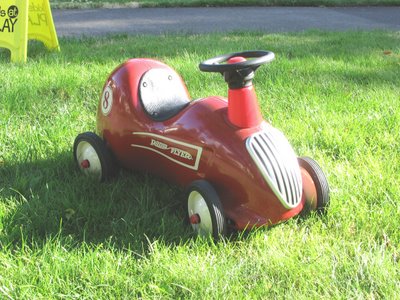 Cars. How do I loathe thee? Let me count the ways:
Cars. How do I loathe thee? Let me count the ways:





 So don’t be telling me I’m some kind of an impostor just because I happened to be riding by a certain place at a certain time. Just because I followed along like a lemming. How did I know all that was going to happen? If someone approached you and draped a medal around your neck, what would you do? I rolled with it – just like I’d been rolling along with those cyclists. I sensed something going on, my reporter instincts rose up, and I started pushing that button on the camera that hangs permanently around my neck. My only intention was to record the event. I can’t help it if everyone started applauding and high-fiving me -- I was only trying to blend in so I could take exciting, action photos from the vantage point of the participants.
So don’t be telling me I’m some kind of an impostor just because I happened to be riding by a certain place at a certain time. Just because I followed along like a lemming. How did I know all that was going to happen? If someone approached you and draped a medal around your neck, what would you do? I rolled with it – just like I’d been rolling along with those cyclists. I sensed something going on, my reporter instincts rose up, and I started pushing that button on the camera that hangs permanently around my neck. My only intention was to record the event. I can’t help it if everyone started applauding and high-fiving me -- I was only trying to blend in so I could take exciting, action photos from the vantage point of the participants. (Do you see it hanging on a blue string in her right hand? She's got a bunch more hanging from her left hand on blue strings.)
(Do you see it hanging on a blue string in her right hand? She's got a bunch more hanging from her left hand on blue strings.)





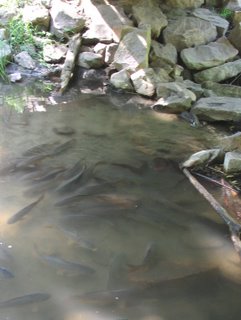



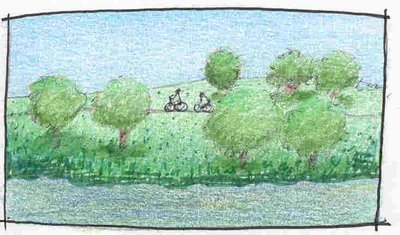 My brother-in-law narrator pointed out various aborted plans to build bike paths around the lakes, so far voted down by some of the local citizenry who fear such amenities will attract riff-raff to the area. The cemetery is of particular concern. Can’t you just see it? Two-wheeled hoodlums stopping to overturn a few headstones on their way through. On the pro side, the argument is made that bicycle and pedestrian traffic would provide a steady stream of eyes on the cemetery, discouraging vandalism, which is more likely to occur in sparsely frequented areas. Further development of the paths is suspended till they can come up with the necessary vandal profiling criteria.
My brother-in-law narrator pointed out various aborted plans to build bike paths around the lakes, so far voted down by some of the local citizenry who fear such amenities will attract riff-raff to the area. The cemetery is of particular concern. Can’t you just see it? Two-wheeled hoodlums stopping to overturn a few headstones on their way through. On the pro side, the argument is made that bicycle and pedestrian traffic would provide a steady stream of eyes on the cemetery, discouraging vandalism, which is more likely to occur in sparsely frequented areas. Further development of the paths is suspended till they can come up with the necessary vandal profiling criteria.
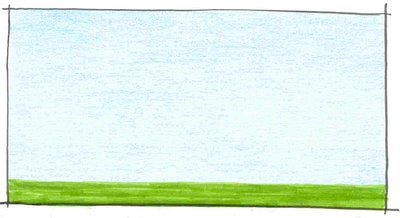 Maybe I’ve just answered the cycling conundrum. On a bike, you’d see this view for a week.
Maybe I’ve just answered the cycling conundrum. On a bike, you’d see this view for a week.
